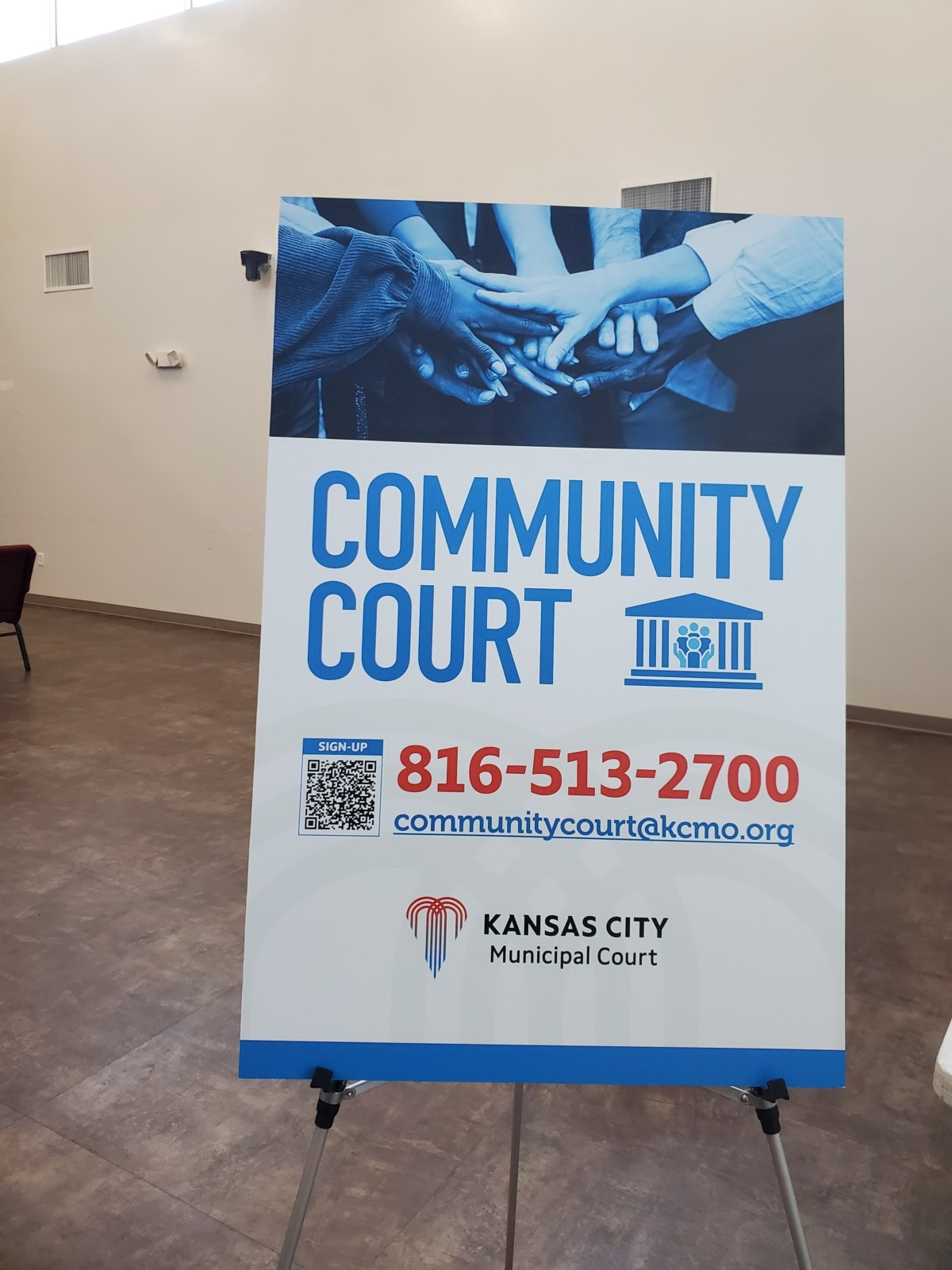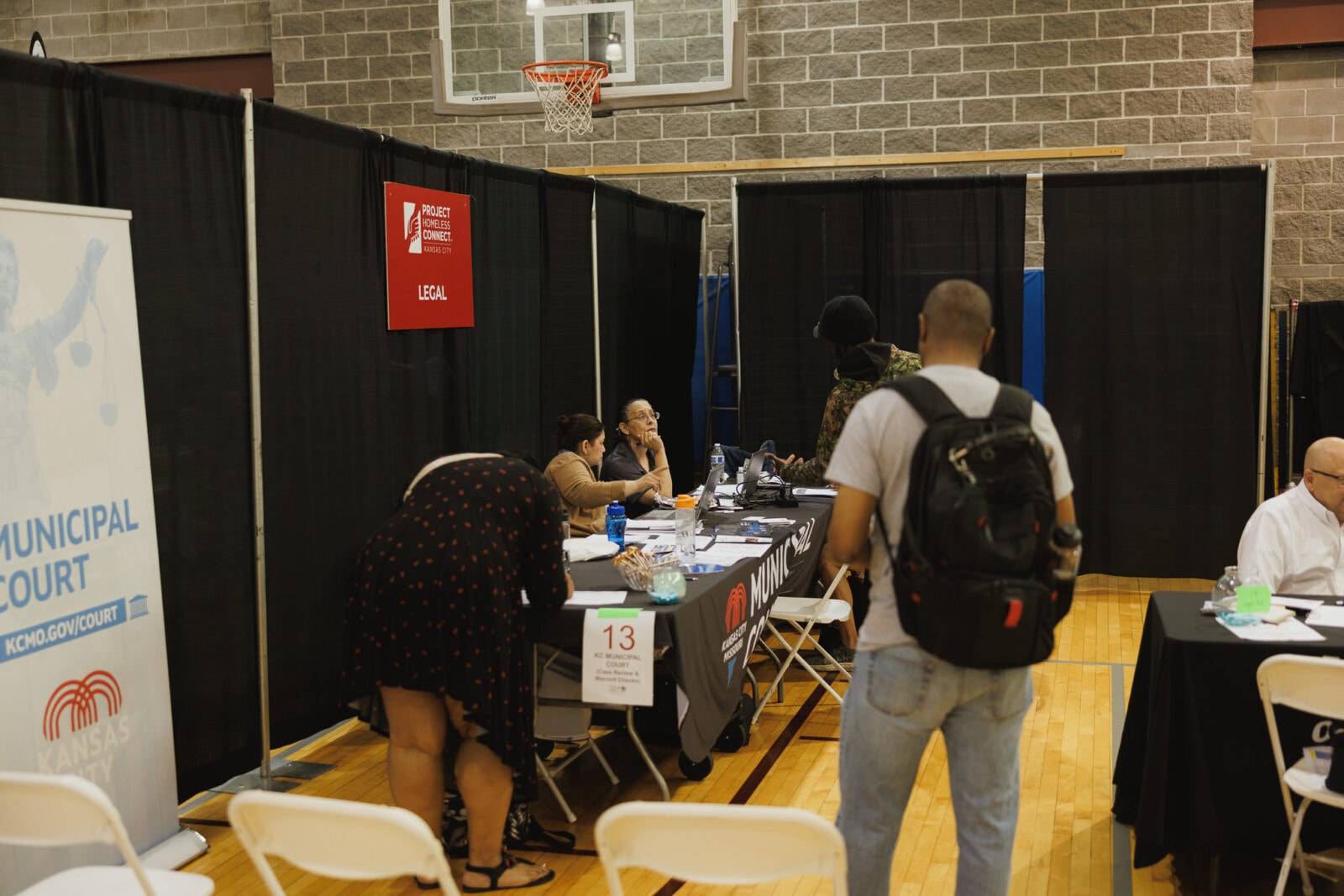Kansas City is taking court “straight to the people” with a new Community Court that convenes at a multipurpose center in the urban core, not the downtown courthouse.
The off-site location at 27th Street and Prospect Avenue is essential to the specialty court’s focus on serving people experiencing instability issues, such as homelessness, by providing easier, less threatening access to Municipal Court and its services.
“I think many people, they get warrants on them and they’re afraid to go to the courtroom,” said the Rev. John Modest Miles, pastor of the church that anchors the Morning Star Family Life and Youth Center, where Community Court debuted on June 10.
Well known in central Kansas City for its food pantry, clothing and other programs, the Morning Star center provides a trusted community setting for people wanting to address outstanding warrants and quell fears of being arrested if they come to court.
The courtroom is set up in a large room, with multiple rows of chairs facing the front and a podium across from Judge Martina Peterson and the court clerk. At another table, just steps away, is a Legal Aid attorney who can take a defendant’s application for assistance directly after their appearance.
Warren Hayter, managing attorney at Legal Aid of Western Missouri, said applications are normally handled by Municipal Court and sent to his office for review. But at this first Community Court session, he met with each applicant.
His plan for future sessions is to hopefully resolve the cases of clients who have applied previously.
Those who come to Community Court, which is held on the second Tuesday of every month, also have access to the resources offered by the center.
Just as it would if it met downtown, Community Court hears almost every type of Municipal Court case, except for those related to domestic violence, housing, animals, or cases previously set for trial.
Peterson, who has served as a judge in family and mental health courts, is the catalyst behind the Community Court.


It was frustrating to see someone come in who was making strides, such as completion of a treatment program, only to be denied a next step forward, like entry into transitional housing, because of a pending warrant.
“I started talking to different people, doing different activities to lift warrants, and people were just so appreciative,” Peterson said.
Going to court to take care of a warrant isn’t always easy for people in this vulnerable community. In addition to fears of arrest, they might not have transportation.
“I decided to bring the court to the people,” Peterson said.
Piloting the Concept
Peterson and Municipal Court staff piloted the concept last year by reviewing warrants at community resource sites and events across Kansas City.
Those outreach efforts continue.
In May, the court set up a table at ReStart’s Project Homeless Connect at the Gregg/Klice Community Center, where dozens of people inquired about clearing up their warrants.
Among those was a 32-year-old woman who listened carefully as Peterson, with a court clerk beside her, went over the two cases that prompted the warrants interfering with her release from probation.
The woman explained that she no longer had a car or a job.
“Are you working with any organization to become stable?” Peterson asked.
Yes, City Union Mission,” she said.
In concluding that the woman’s efforts counted as community service, Peterson closed the cases, cancelled the warrants, and released her from probation.
“Keep working on becoming stable,” Peterson advised.
“I will. Thank you so much. I appreciate your help,” the woman said as she headed to another table in the crowded gym.
By day’s end, Peterson had cancelled 84 warrants for 44 individuals. In the 12 events the Municipal Court attended last year, it resolved 487 warrants for 154 defendants, according to court spokeswoman Benita Jones.


Peterson and members of the Municipal Court staff, along with representatives from Legal Aid and Kansas City’s Office of Unhoused Solutions, visited the Downtown Community Court and Homeless Outreach Street Team (HOST) in Austin, Texas, last year.
While they found good ideas in Austin and from other programs, none were the right fit for Municipal Court in Kansas City, Peterson said. “So I created my own model.”
“I wanted to work with different aspects of helping people in the community, each one a little different,” she explained.
The court will start doing “pop-up courts” next year at treatment providers, community sites such as the library, where some unhoused populations gather during the day, and at homeless camps.
“I’m working with partners in that community and with addiction rehabs to bring these warrant reviews to help more people, to help people in their journey to create more stability,” said Peterson, who was the judge for Family Court for nine years and most recently Mental Health Court, which the city merged with drug court into Wellness Court this year.
Another aspect is CARE, or Community Assistance, Recovery, and Empowerment, a three- to six-month program for people who are homeless or on the verge of being homeless but without a significant drug or mental health issue that may fall in a specialty court. There’s an action plan for each participant.
A ‘Women’s Court’ Joins Specialty Court Lineup
Municipal Court has also added a Women in Need of Change (WIN) Court, also known as Women in Transition/Transformation, to its lineup of “problem-solving” courts.
Launched in March in honor of Women’s History Month, the court is designed to promote recovery, independence, and self-sufficiency for women who have experienced physical, sexual, and/or emotional abuse.
“Women who have a history of substance misuse and trauma need a space to process both so they can recover and not reoffend,” said Judge Shayla Lewis, who presides over the court.
Referrals to Women’s Court come from Legal Aid, court staff, or the probation department. Or, sometimes women ask about it when facing jail time for municipal ordinance violations, Lewis said.
Participants appear in WIN Court every Thursday morning. During the week, they also receive substance use treatment, trauma-responsive therapy, and further their education and financial literacy skills with community partners.
“The women are held accountable and are doing the difficult work to change their lives for good with the support of our court,” Lewis said. “Our goal is for women to recover and thrive, and for our communities to be better because of it.”
Specialty courts, which bring resources that aren’t always employed in regular criminal cases, have proven effective in improving long-term outcomes for participants, said Steve Leben, a professor and associate dean at the University of Missouri-Kansas City Law School.
“If drug addiction or drug use, or a mental health problem is the real problem, if you can find a way to address it while they’re in the system that can reduce recidivism,” said Leben, who served as a judge in Kansas for 27 years, including 13 years on the Court of Appeals.
And that’s certainly the hope for people using the new Community Court, said Miles, the pastor of Morningstar Missionary Church.
“Their whole life could be changed,” he said.
Toni Cardarella is a freelance journalist based in Kansas City.
(Except for the headline, this story has not been edited by PostX News and is published from a syndicated feed.)

